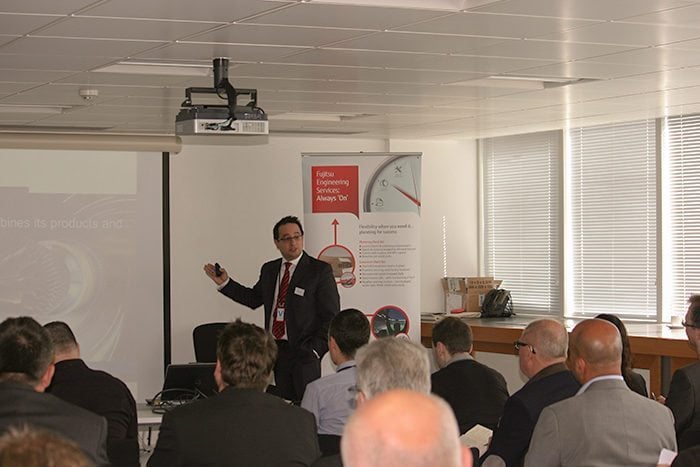Service Community Conference - Outcome Based Services – 16th April 2015
Apr 28, 2015 • Features • Future of FIeld Service • Service Community • Servitization
Held at Fujitsu Stevenage, this event brought together 35 service professionals from around the country who listened to and discussed four excellent presentations covering various aspects of Outcome Based Services.
The excellent speaker this time around were:
- Veronica Martinez a globally eminent researcher in the area of Servitisation, presented an overview of the research she has been doing with the Cambridge Service Alliance. She told us how some of the worlds leading brands have approached developing Outcome Based Services, giving an exceedingly deep insight into the change process. Brilliant for any manager working on service transformation!
- Alex Bill gave his perspective of developing Outcome Based Service at the coal face. As a service professional in a major Power Generation OEM, he gave us insights into how the business model to make money is not as simple as just selling a service.
- Des Evans, the Ex CEO of MAN UK gave us the business perspective on servitisation, with insights from his 23 year journey to grow the business from £55M to £550M. It was a must ‘hear’ for anyone selling service concepts to their board.
- Chris Farnath Director International at Allocate Software, shared his own personal journey in leading business change toward outcome based services in the IT/Software world. Again incredibly useful to understand how he is approaching the ‘messy’ challenge of service transformation.
Thanks to all the participants for a great networking and discussion event
For a personal perspective on the event, read Martin Summerhayes’ account below which is also published in his personal blog.
Service Community Conference - Outcome Based Services
[quote]“The purpose of a business is to get and keep a customer. Without customers, no amount of engineering wizardry, clever financing, or operations expertise can keep a company going.” ― Theodore Levitt
The first Service Community event for 2015 was held this week. There are two Service Community conferences that are held every year. They were first started by a wonderful consultant and friend, Steve Downton, many years ago and have continued to be popular and thought provoking events. Unfortunately, Steve lost his battle with cancer last year and a number of the core members of the community [including myself] decided to keep the event going - as much in Steve’s memory - as well as it gives a fantastic, open forum to share ideas, the latest thinking and case studies from the world of Services.
One of the key differentiators to other events, is that it brings together service practitioners to discuss and share ideas, changes in markets, share best practices and case studies. It is not an event where people come to try to sell products, services or companies - this is not what the Service Community is about.
Here were delegates from the widest spectrums of industries, including: Power Generation, Academia, Construction, Cancer Technology Treatment, Sports Goods Technology, Logistics, Digital Photography, Soft Drinks Manufacturing and then the traditional IT and IT Services businesses.
What brought us together for this conference? The theme was “Outcome Based Services (OBS)”.
A number of points struck me during the series of four presentations and follow up discussions during the event. Obviously, the first point to mention, is what on earth are Outcome Based Services? The following points highlight the key elements of Outcome Based Services:
1. Predetermined results and predictable costs defined in agreement with the customer and are a reflection of the customers business:
One example quoted related to the transport industry. The traditional approach is to pay separately for the truck, servicing, tyres, risk certification and then the fuel and driver. The customer then has to try to find the best deals for each of these elements. In addition, something I did not know is that a truck is only productive 25% of the time i.e. actually on the road delivering products and goods and hence making money. The OBS approach is to provide the vehicle and charge the customer on “price per kilometre”.
2. Protection of the client’s investments:
One of the concepts discussed was leasing the product and having all of the associated services wrapped around it in a single charge. For example, the Rolls Royce model used to lease aero-engines which was shared at a previous event.
3. Short, medium and long-term savings adapted to changing client needs:
One example was based on the savings from the production of electricity for the national grid using gas turbines. The customer could pay for either short term availability [how quickly you can turn on/off a turbine], medium term savings from the use of fuel, or even longer term savings from the ability to have upgrades build into the outcome based charging model which means the product stays in useful 2-5 years longer.
4. Use of methodologies, tools and processes to deliver outcome commitments and continual productivity improvements:
The presentation from the University of Cambridge Service Alliance included a Service Strategy model - with examples where different customers had started the journey to “OBS”, In addition, the presenter talked about you might have to segment your customers as only some would be interested in OBS; that Risk Management and how you would deliver exactly what was required [the example given was the tonnage of rock removed by an explosives company] was critical and even giving away low margin services for “free” to be able to maintain a “sticky” relationship with your customers.
5. Operational excellence through the use of best practices, regularly reviewed to ensure their long-term applicability:
The final example was a software company that realised that the current, traditional approach of implementing software solutions was not meeting the needs of their customers and has started on a journey to change the complete services landscape across their organisation to focus on “Adoption”. They had attended and worked with the leading industry experts, learnt the best practices and were implementing them in their organisation. The key to their success, though, was that the entire Operations Board of the company was behind the move.
My overall definition of Outcome Based Services based on the presentations and examples given would be:
Outcome Based Services are where you as the Service Provider, COMMIT to providing high-quality; customer defined and reflective of THEIR business; services; aligned with predetermined service levels and fixed prices, where there is a Shared Risk and Reward strategy in place for both supplier and customer.
Be social and share this report





















 Field Service News is published by 1927 Media Ltd, an independent publisher whose sole focus is on the field service sector. As such our entire resources are focused on helping drive the field service sector forwards and aiming to best serve our industry through honest, incisive and innovative media coverage of the global field service sector.
Field Service News is published by 1927 Media Ltd, an independent publisher whose sole focus is on the field service sector. As such our entire resources are focused on helping drive the field service sector forwards and aiming to best serve our industry through honest, incisive and innovative media coverage of the global field service sector.
Leave a Reply